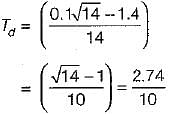Electrical Engineering (EE) Exam > Electrical Engineering (EE) Questions > For the derivative feedback control shown in ...
Start Learning for Free
For the derivative feedback control shown in figure below, the damping ratio is equal to 0.7

The value of derivative gain constant is

The value of derivative gain constant is
- a)0.125
- b)0.382
- c)0.274
- d)0.22
Correct answer is option 'C'. Can you explain this answer?
| FREE This question is part of | Download PDF Attempt this Test |
Most Upvoted Answer
For the derivative feedback control shown in figure below, the damping...
For the given system, characteristic equation is

or,
s2 + 1.4s + 14s Td + 14 = 0
or,
s2 + (1.4 + 14Td) s + 14 = 0
Comparing with s2 + 2 ξωn + ωn2 =0, we have:
ωn = √14 rad/s and 2ξωn = (1.4 + 14Td)
or, 2 x 0.7 x √14 = 1.4 + 14 Td (∴ ξ = 0.7, given)
or,

or,

= 0.274

or,
s2 + 1.4s + 14s Td + 14 = 0
or,
s2 + (1.4 + 14Td) s + 14 = 0
Comparing with s2 + 2 ξωn + ωn2 =0, we have:
ωn = √14 rad/s and 2ξωn = (1.4 + 14Td)
or, 2 x 0.7 x √14 = 1.4 + 14 Td (∴ ξ = 0.7, given)
or,

or,

= 0.274
Attention Electrical Engineering (EE) Students!
To make sure you are not studying endlessly, EduRev has designed Electrical Engineering (EE) study material, with Structured Courses, Videos, & Test Series. Plus get personalized analysis, doubt solving and improvement plans to achieve a great score in Electrical Engineering (EE).

|
Explore Courses for Electrical Engineering (EE) exam
|

|
For the derivative feedback control shown in figure below, the damping ratio is equal to 0.7The value of derivative gain constant isa)0.125b)0.382c)0.274d)0.22Correct answer is option 'C'. Can you explain this answer?
Question Description
For the derivative feedback control shown in figure below, the damping ratio is equal to 0.7The value of derivative gain constant isa)0.125b)0.382c)0.274d)0.22Correct answer is option 'C'. Can you explain this answer? for Electrical Engineering (EE) 2024 is part of Electrical Engineering (EE) preparation. The Question and answers have been prepared according to the Electrical Engineering (EE) exam syllabus. Information about For the derivative feedback control shown in figure below, the damping ratio is equal to 0.7The value of derivative gain constant isa)0.125b)0.382c)0.274d)0.22Correct answer is option 'C'. Can you explain this answer? covers all topics & solutions for Electrical Engineering (EE) 2024 Exam. Find important definitions, questions, meanings, examples, exercises and tests below for For the derivative feedback control shown in figure below, the damping ratio is equal to 0.7The value of derivative gain constant isa)0.125b)0.382c)0.274d)0.22Correct answer is option 'C'. Can you explain this answer?.
For the derivative feedback control shown in figure below, the damping ratio is equal to 0.7The value of derivative gain constant isa)0.125b)0.382c)0.274d)0.22Correct answer is option 'C'. Can you explain this answer? for Electrical Engineering (EE) 2024 is part of Electrical Engineering (EE) preparation. The Question and answers have been prepared according to the Electrical Engineering (EE) exam syllabus. Information about For the derivative feedback control shown in figure below, the damping ratio is equal to 0.7The value of derivative gain constant isa)0.125b)0.382c)0.274d)0.22Correct answer is option 'C'. Can you explain this answer? covers all topics & solutions for Electrical Engineering (EE) 2024 Exam. Find important definitions, questions, meanings, examples, exercises and tests below for For the derivative feedback control shown in figure below, the damping ratio is equal to 0.7The value of derivative gain constant isa)0.125b)0.382c)0.274d)0.22Correct answer is option 'C'. Can you explain this answer?.
Solutions for For the derivative feedback control shown in figure below, the damping ratio is equal to 0.7The value of derivative gain constant isa)0.125b)0.382c)0.274d)0.22Correct answer is option 'C'. Can you explain this answer? in English & in Hindi are available as part of our courses for Electrical Engineering (EE).
Download more important topics, notes, lectures and mock test series for Electrical Engineering (EE) Exam by signing up for free.
Here you can find the meaning of For the derivative feedback control shown in figure below, the damping ratio is equal to 0.7The value of derivative gain constant isa)0.125b)0.382c)0.274d)0.22Correct answer is option 'C'. Can you explain this answer? defined & explained in the simplest way possible. Besides giving the explanation of
For the derivative feedback control shown in figure below, the damping ratio is equal to 0.7The value of derivative gain constant isa)0.125b)0.382c)0.274d)0.22Correct answer is option 'C'. Can you explain this answer?, a detailed solution for For the derivative feedback control shown in figure below, the damping ratio is equal to 0.7The value of derivative gain constant isa)0.125b)0.382c)0.274d)0.22Correct answer is option 'C'. Can you explain this answer? has been provided alongside types of For the derivative feedback control shown in figure below, the damping ratio is equal to 0.7The value of derivative gain constant isa)0.125b)0.382c)0.274d)0.22Correct answer is option 'C'. Can you explain this answer? theory, EduRev gives you an
ample number of questions to practice For the derivative feedback control shown in figure below, the damping ratio is equal to 0.7The value of derivative gain constant isa)0.125b)0.382c)0.274d)0.22Correct answer is option 'C'. Can you explain this answer? tests, examples and also practice Electrical Engineering (EE) tests.

|
Explore Courses for Electrical Engineering (EE) exam
|

|
Suggested Free Tests
Signup for Free!
Signup to see your scores go up within 7 days! Learn & Practice with 1000+ FREE Notes, Videos & Tests.






















